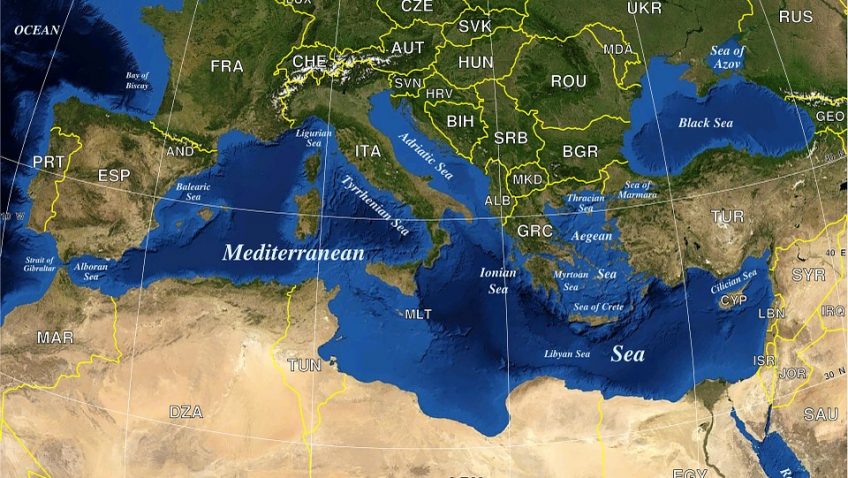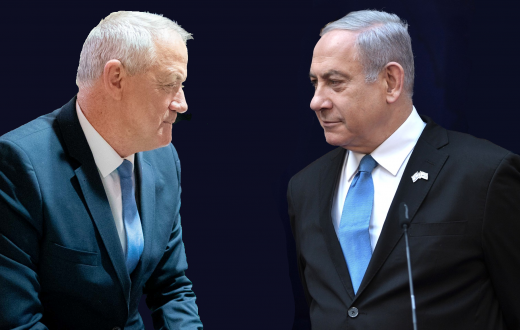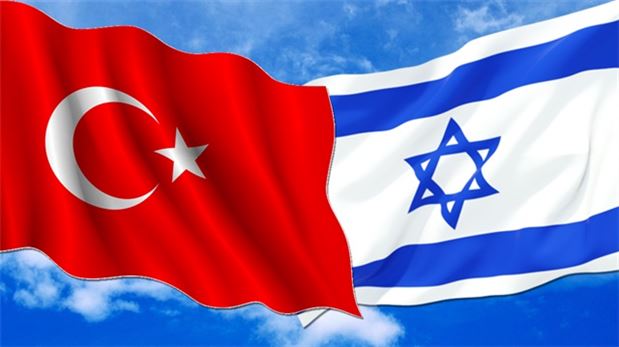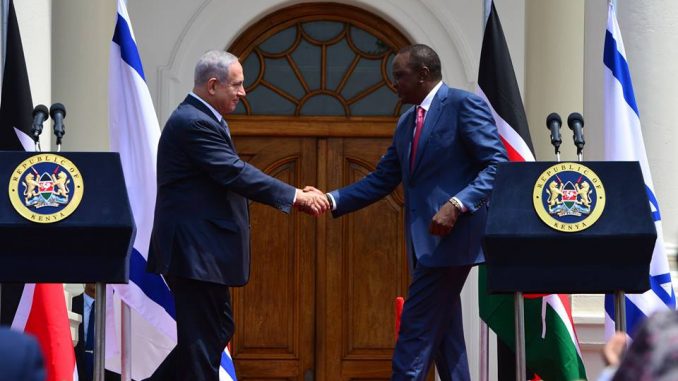The world today is witnessing many areas that suffer from conflicts with different causes of conflict from one region to another, and among those areas that suffer from conflict, the Eastern Mediterranean region, this region is currently experiencing intense conflict due to the discovery that that region contains large quantities of natural gas And oil, according to studies from specialized agencies that the eastern Mediterranean basin is a region rich in oil and natural gas, and the amount of natural gas is estimated at approximately 122 trillion cubic feet of natural gas. Therefore, the eastern Mediterranean region has gained great importance among the countries bordering it and among many From international actors such as Russia and the European Union, and accordingly, the countries of that region began to accelerate the definition of their maritime borders, in order to determine the maritime areas in which the countries can exploit their discovered wealth, which led to the outbreak of conflict between the countries of that region due to the disagreement over the determination of maritime borders from The point of view of each country, this is in addition to the fact that there are countries in that region that did not sign the law of the sea, such as Turkey, and this complicates the conflict in that region and increases its intensity, in addition to the lack of most of the countries of that logic Energy sources of natural gas and oil, which makes it dependent on importing these sources, which constitutes a burden on those countries that view the recently discovered resources in the Eastern Mediterranean region as a ray of hope and a lifeline that will enable them to help achieve many goals such as moving towards Achieving economic development by reducing imports of energy sources and exploiting the newly discovered resources that fall within the maritime borders of each country, all of this has led to the escalation of conflict in that region due to the previous reasons and we will review through this study the following axes.
The strategic importance of the eastern Mediterranean region.
Axes of conflict and the direct parties to it.
Other international actors in the East Mediterranean equation.
A vision for the future of the conflict in the eastern Mediterranean.
The strategic importance of the Eastern Mediterranean region:
The Eastern Mediterranean region has become of great importance to the countries of that region and to other parties such as Russia and the European Union, for example. The importance of that region has increased dramatically after the US Geological Survey published a study in 2010 stating that the eastern Mediterranean region has a huge wealth of oil. And natural gas is estimated at 122 trillion cubic feet of natural gas and 1.7 billion barrels of oil reserves. Estimates of gas exploration indicate that this region has much greater quantities, which makes this region a great importance, and accordingly the countries bordering that region hastened By demarcating its maritime borders in order to secure its share of those wealth that lies within its borders and work to exploit and benefit from it, which led to the outbreak of conflict in that region and although the natural gas wealth of that region is approximately 122 trillion cubic feet, yet the discovered fields And that is being worked out is estimated at 68 trillion cubic meters, and one of the most important fields discovered in the eastern Mediterranean region, which are distributed among the countries of the region as follows:
Israel:
Israel has a share of the wealth discovered in that area, and its most important fields are:
A / Tamar field: The Tamar field is located at a distance of 90 km from the coast off Haifa, and the storage of that field is estimated at 10 trillion cubic feet of natural gas, and it was discovered in 2009 .
B / Tanin field: This field is located west of Haifa and is approximately 120 km from the coast, and it is estimated that it contains natural gas reserves estimated at 1.2 trillion cubic feet of natural gas .
A / Leviathan field: The Leviathan field is 130 km away from the coast, which was discovered in 2010 and it is estimated that it contains natural gas reserves estimated at 535 billion cubic meters of natural gas, or approximately 18 trillion cubic feet.
Gaza Strip:
Gaza has a share of the wealth discovered in the eastern Mediterranean, and one of its most important fields is:
A / Gaza Marine Field: It is a field that was discovered by the British company (British Gas) in 2000 AD and the volume of natural gas reserves in it is estimated at 1.2 trillion cubic feet of natural gas and it is located in the territorial waters of the Gaza Strip and is 35 km from the coast .
Cyprus:
Cyprus has a share of the wealth of the Eastern Mediterranean, and among the most important discovered Cypriot fields:
A / Aphrodite field: It is a field located in the southeast of the island of Cyprus in region 12 and the discoverer of this field was the American company (Noble Energy) in 2011 AD. The volume of gas reserves in this field is estimated at 127.4 billion cubic meters of natural gas.
B / Calypso field: This field was discovered by the Italian company (Eni) and (Total) France, and the volume of reserves in this field is estimated from 6 to 8 trillion cubic feet of natural gas.
Egypt
Egypt has many fields in that region, which makes it have a large share in the wealth of the Eastern Mediterranean region. Among the most important Egyptian fields are:
A / Zohr field: The Zohr field is 150 km away from the Egyptian coast and has a reserve volume of 30 trillion cubic feet of natural gas and it is the largest natural gas discovery in Egypt and the Mediterranean.
Atoll field: This field is located in the North Damietta marine concession area. The volume of reserves in this field is estimated at 1.5 trillion cubic feet of natural gas.
Because of the discovery of wealth in the eastern Mediterranean region in huge quantities, and because of the overlapping of the maritime borders of the countries of the region and their dispute over determining those borders to determine the share of each country of that wealth in addition to the existence of conflicts older than the struggle for that wealth in an eastern region such as the Turkish-Greek conflict, and the Arab conflict. The Israeli, Turkish-Cypriot conflict, in addition to the presence of some countries that did not sign the law of the sea, such as Turkey, all of this led to an increase in the intensity of the conflict in the eastern Mediterranean region and led to an increase in the scope of the conflict in that region, which threatens serious consequences if it is not agreed by peaceful means about determining the borders. The maritime region between the countries of that region in order to determine its wealth in a manner acceptable to all concerned parties without affecting the utilization of the resources of the Eastern Mediterranean region, and the aforementioned discoveries in the Mediterranean region did not gain importance to the countries bordering on it only, but also gained importance to other international parties such as the European Union. Which relies heavily on Russia to supply it with natural gas. The European Union found the newly discovered Eastern Mediterranean gas an opportunity to diversify the sources of natural gas that come to it from abroad, which is a dangerous matter. For Russia, which is one of the largest exporters of natural gas to Europe, which makes it use natural gas as a pressure card in the face of the European Union in some files, and accordingly, the importance of the Eastern Mediterranean region has increased for both Russia, which seeks to invest in the eastern Mediterranean region, to also benefit from Eastern gas. The Mediterranean, and the European Union, which seeks to diversify its natural gas exports to avoid Russian pressure.
Parties to the conflict in the Eastern Mediterranean:
The conflict in the Eastern Mediterranean is characterized by the overlapping and multiplicity of dimensions and parties to the conflict between direct parties and other international parties. The pace of the conflict began to accelerate after a report by the US Geological Survey in 2010 that there were 3455 billion cubic meters of gas and 1.7 billion barrels of oil. The most geostrategic region that poses a threat to the future of international peace and security, and this geopolitical importance may cause an increase in the rates of regional conflict and an increase in the level of differences between the countries of this region, and this importance has prompted the countries of the region to legalize their status legally regarding the delineation of maritime borders according to the United Nations On the other hand, Turkey sought to explore for gas in the economic zones of Cyprus and Greece without regard to the international laws regulating these operations, and it resorted to legalizing this by signing two agreements to demarcate the maritime borders with Libya, and then the tensions escalated in the countries concerned. And related to the disputes over the maritime borders of each country
Axes of conflict and direct parties to it:
Conflict between Turkey and Greece
Turkish-Greek relations have witnessed many periods of ebb and flow since Greece gained independence from the Ottoman Empire in 1832 A.D. The problems between the two countries are old and extended for a long time, and relations between Turkey and Greece have witnessed many wars such as:
A / The Turkish-Greek War of 1897 AD.
B / The first Balkan war in 1912.
C / World War I (1914/1918).
D / The Greco-Turkish War (1919/1922).
The relations between the two countries are neither stable nor proceeding on the same pace, just as the relations between Turkey and Greece witnessed periods of war, and the relations between them witnessed periods of peace, and the current relations between Turkey and Greece are witnessing many files such as the Cyprus island file and the maritime border demarcation file. Also between Greece and Turkey and the conflict between Turkey and Greece in the eastern Mediterranean cannot be presented and understood in isolation from the two previous files, and accordingly we will present a summary of the previous two files:
A / The Cyprus Island file:
The island of Cyprus is the third largest island in the Mediterranean after the islands of Sardinia and Sicily, and that island enjoys an important strategic location for the parties to the conflict, whether Turkey or Greece, and this conflict is an obstacle to improving relations between the two parties now, and the problem on the island of Cyprus is due to the state of conflict The conflict increased between the Turkish and Greek Cypriots due to the difference in the viewpoint of the two sides, and the intensity of the conflict increased due to the Greek Cypriots’ call to join Greece, which is what Turkey sees as a blockade of the Turkish maritime borders and sees it as a threat to its interests and national security, which prompted Turkey to intervene in Cyprus and occupy the northern third of it 1974 AD and the clash with Greece and the declaration of that part as an independent state, which is Northern Cyprus (Turkish Cyprus), which is a state that only enjoys international recognition from the state of Turkey, and the other part of the island, which represents two-thirds of the island is the state of Cyprus, which is a country that enjoys With international recognition, the conflict on that island between Greece and Turkey is one of the most important points of disagreement between Turkey and Greece, and it is what also raises a conflict about the rights to explore for wealth discovered in the eastern Mediterranean, which is what we will refer to in Mo Put subsequent .
B / File of demarcating the maritime boundaries between Turkey and Greece:
This file represents one of the important points in understanding the conflict between Turkey and Greece in the eastern Mediterranean, as this file raises a conflict over the rights to explore for wealth in various marine areas such as the state’s exclusive economic zone. In that file, the two countries are competing to demarcate the maritime borders, whether defining regional waters or the shelf Continental. That the Turkish-Greek conflict cannot be understood in isolation from the two previous files, because they transfer the conflict between Turkey and Greece to the conflict over the discovered wealth in the eastern Mediterranean, according to the conflict raised by the two files about the rights to prospect for those discovered wealth. The Turkish-Greek conflict is driven by another motive, which is the lack of resources. Energy in Turkey and Greece and the desire of each of them to control the wealth discovered in the eastern Mediterranean and to explore for them to benefit from them and secure sources of energy in the future.
Turkish-Cypriot conflict:
The conflict between Turkey and Cyprus extends for long decades, and one of the most prominent points of conflict between the two countries was Turkey’s occupation of the northern part of the island of Cyprus, which represents a third of it in 1974 AD, and the division of the island into two parts, as the northern part, which represents almost a third of the area of the island of Cyprus and represents the state of Northern Cyprus Turkish) and it is a country that does not enjoy international recognition except from Turkey, and the other part of the island represents the state of Cyprus, whose capital is Nicosia, and it is a sovereign state that enjoys international recognition and is a member of the European Union. It also deepens the conflict and ignites it in the eastern Mediterranean region because of the disputes it raises over the demarcation of the maritime borders between the two countries and the struggle over the rights to explore the wealth of that region. It should be noted here that although the conflict between Turkey and Cyprus is an old conflict that spanned for many decades, The struggle over the resources and wealth of the Eastern Mediterranean is a relatively recent struggle between the two countries. In 2009, the Aphrodite field was discovered, 180 km from the southwestern coast of Cyprus, with a total stock of 9 trillion cubic feet of natural gas, and the Italian company Eni announced in February 2018 the discovery of the Calypso field in the disputed area between Cyprus and Turkey.
Conflict between Egypt and Turkey:
In 2015, Egypt discovered the largest gas reserves in the eastern Mediterranean in the “Zohr” field, enabling Egypt to meet domestic consumption, which increases annually by about 5%, as gas is used to generate 85% of the country’s electricity. And it provides a surplus for it to export. The demarcation of maritime borders between countries is based on the International Treaty on the Law of the Sea signed in 1982, but Syria, Israel and Turkey did not sign this treaty, and the maritime borders between Egypt and Cyprus were demarcated in 2003 and then in 2013, and Israel signed an agreement to export gas with Egypt in 2018 and protest Turkey is on the borders of the Egyptian economic zone overlooking Cypriot waters, which Cairo rejected as interference in its sovereign affairs. In order to cut off the Turkish hopes for the Mediterranean gas and oil, Egypt and Greece signed an agreement to demarcate the maritime borders between them. Turkish President Recep Tayyip Erdogan described this agreement as “worthless.” The Turkish Foreign Ministry stated that the agreement violates the Turkish continental shelf, and Turkey sent its ships to explore near the Greek islands .
Egypt entered the gas market at the end of 2014 and early 2015 when the discovery of the Zohr field was announced by an Italian exploration company.
This discovery strengthened Egypt’s role in the natural gas market in the region, especially since Egypt has two liquefaction plants for natural gas. This discovery has preceded and since In 2014, a noticeable improvement in the Egyptian-Greek-Cypriot-Greek relations, with the holding of several tripartite meetings, in addition to the restoration of the Egyptian-Israeli relations.
The dispute over the maritime borders between Lebanon and Israel
The crisis in the conflict between Lebanon and Israel is focused on a part of Block No. 9, located at the border line between the two countries. Lebanon rejected the Israeli-Cypriot agreement due to its disagreement on the triple point between the three countries, which led to the attack on nearly 850 square kilometers of the economic area. Own exclusive. The series of conflict between the two countries continued on February 9, 2018, when Lebanon announced the signing of two agreements with the French companies “Total” and “ENI” Italy and “Novatek” for exploration and production of oil and gas at sea in Block 4 and Block 9, part of which is located in the disputed waters. On her with Tel Aviv
The maritime agreement between Cyprus and Lebanon confirmed that neither party had agreed with a third party without returning to the second party to obtain his prior approval, but Nicosia later took the initiative to agree with Tel Aviv and demarcate the borders of its exclusive economic zone with it without informing Lebanon, The United States tried to play the mediating role, but to no avail, as the American negotiator demanded political conditions for Lebanon to present them, which led to the faltering of negotiations, as Lebanon rejected the American demands.
The Syrian share of the wealth of the Eastern Mediterranean
It is not possible to understand the Syrian share in isolation from the Russian role in the region, as well as its presence on the ground, as Russia controls the Syrian coast, and therefore Syria is outside the equation so far, and the initiative is in Russia’s hands in this regard.
The US Geological Authority estimated Syria’s reserves of natural gas in the Mediterranean at 700 billion cubic meters, while the total Syrian reserves of gas after adding many new discoveries reached 28 trillion cubic meters, and the Ferrell Center for Studies in Berlin expected that Syria would occupy the third place. In the world in producing gas, if it were able to raise its production capacity to its maximum.
Likewise, Syria did not sign the International Law of the Seas, and in 2011, when the revolution broke out, the issue in the eastern Mediterranean was taking shape and thus it is outside the conflict and outside the demarcation of the borders, so that the initiative will remain in Russia’s hands. And Turkey – Syria with the Assad regime.
Other international actors in the East Mediterranean equation:
Exploration operations in the Eastern Mediterranean are managed by Italian, French, American and Russian companies, and this puts the countries of these companies within the circle of economic competition over the wells discovered, and the European Union also seeks to enhance energy security by diversifying sources of imports and supply methods, as Eastern Mediterranean gas contributes to reducing dependence Nearly the whole of the countries of Eastern and Southern Europe is about Russia, and that is why the Union is keen to achieve the maximum possible benefit from the region and also cares about the interests of member states such as Cyprus and Greece. Moscow is also present in this file through exploration companies in the case of Lebanon, providing financial financing to Cyprus and Greece, and the military presence and bilateral agreements with Syria.
A future vision of the conflict in the eastern Mediterranean:
Most of the estimates agree on the difficulty of decisively predicting the security situation in the eastern Mediterranean region, in light of the current security liquidity in the eastern Mediterranean and given that most of the cases are still unstable, and it is not possible to bet on the stability prospects that seem less than the possibilities of more explosions There are three scenarios that may lead to the conflict in the Eastern Mediterranean region, at least in the short term.
The scenario of forming and building multi-lateral relationships:
A scenario that includes a formula for stability and cooperation between some forces in exchange for opposing forces as a result of the conflict of interests of the two parties. The owners of this trend do not prefer to call this type of inter-relations completely alliances, but rather multi-lateral relations, especially since there are challenges related to the strategic requirements for building alliances, including There is no complete match in the views regarding many issues .
Hence, Ankara seeks to lure the invading partners in the eastern Mediterranean to the dialogue table by pressuring to send drilling ships, accompanied by warships off Cyprus and some Greek islands, on reconnaissance missions and thus it is possible that Turkey does not intend to engage in a losing military battle with its neighbors, but rather looms With this skirmish to improve the terms of negotiation with the countries of the region, to be part and partner in this project.
Hence, this scenario assumes that Turkey will continue to pursue its escalatory policies and create its own alliances, and therefore that, in light of the existence of the Eastern Mediterranean Forum, which is supported by the United States of America, which includes (Egypt, Palestine, Jordan, Israel, Cyprus, Greece, and Italy), it is noticed that it is not invited. Turkey and Russia to participate in it, so we can say that this forum represents an axis that could be matched by another axis that Turkey seeks to form by attracting Lebanon to this axis, especially since Lebanon did not join the forum, and it may not be able to reach a settlement guaranteeing its right to Block 9 disputed with Israel. There is a possibility that Palestine will join this axis. Although Palestine is in the Mediterranean forum, it is not yet able to exploit its wealth, in addition to the difficulty of demarcating the maritime borders with Israel, at least in the short term and finally
The state of Iran could join the Turkish axis as an energy-producing country, and therefore it is in its interest to maintain its share in the global markets. Iran is a supporter of the Lebanese Hezbollah, which makes it a part of this axis.
Compatibility scenario:
This scenario assumes the possibility of consensus among the countries of the region regarding the delineation of maritime borders in accordance with the rules of international law and in light of the United Nations Convention of the Seas, through positive roles for either the European Union or the United Nations, American mediation or international arbitration. Also, Erdogan’s announcement of the discovery of a huge gas field in the Black Sea, which contains 320 billion cubic meters of gas.
Assuming the correctness of this discovery, the rules of the equation in the eastern Mediterranean will change slightly, as this reassures Ankara that it has natural resources far from the eastern Mediterranean region, and thus this may reduce its hostile policies, but it is difficult to verify the validity of this disclosure because it was made by the Turkish National Oil Company. TPAO
There may be an international role capable of convincing Turkey of the need to stop its efforts to evade international agreements that it signed in the past, and to stop its efforts to expand its influence in the region, in order to end the state of tension and move towards calm, in a way that helps to benefit from the region’s wealth, especially since all International parties need to. Greece is keen to benefit from this wealth to overcome its continuing economic difficulties, and countries such as Egypt seek to maximize its role as a regional gas hub, while Washington wants American companies to obtain exploration rights in the region. As for Europe, it seeks to reduce Russian pressure on it with the gas paper, and its attempts to diversify energy supplies, and considers that a new gas export center in the eastern Mediterranean is attractive to it, and Turkey may find a formula through which it can benefit from the state of calm and stability that will prevail in the region.
Scenario of escalation and military confrontation:
The eastern Mediterranean has turned into a new arena for a number of international and regional parties because of the gas fields, and thus this scenario assumes the possibility of an escalation between economic and political sanctions and military skirmishes until it reaches the level of direct military confrontation between some countries bordering the Mediterranean, and one of the most important potential confrontations will be between Turkey and Greece on the one hand, and between Lebanon and Israel on the other hand, especially since in the past the colonial competition for oil was confined to the major countries. Now, in light of the market economy, global companies see wealth comparable to the wealth of countries, they also have a role in the field of competition, even if they stand behind countries In search of influence and control, a topic that further complicates the conflict.
What may increase the intensity of the conflict in the Eastern Mediterranean is that it is not the only one affecting the nature of the tense relations between the countries of the region, but rather nurtures historical roots of the conflict, such as the Arab-Israeli conflict in the case of Lebanon and Israel, and the Cyprus island problem is also present in the case of Turkey and Greece, and we find that the Egyptian-Turkish dispute over Turkey’s support for groups Political Islam that threatens Egyptian national security has a role, and hence, mainly old political differences play a role in increasing the intensity of conflicts.
In addition to the high indications of militarization, the American and Russian military presence (Tartous and Hmeimim), the Egyptian armament, the repeated military maneuvers between the countries of the region, the continuation of Turkish harassment in Cypriot waters, and the corresponding French escalation.
Conclusion
The Middle East region, with its intertwined conflicts and interests as well as conflicts, opens its arms again to host more, and that is after the discovery of new wealth in the eastern Mediterranean, we have presented in our study the economic importance of these discoveries as well as the strategic importance of the region, then move to present the position of four parties The equation is directly, namely Egypt, Cyprus, the Gaza Strip and Israel, then moving to present the rest of the parties, respectively, by reviewing the axes of the conflict in the region, so the Turkish side was presented in the axes of the conflict with Cyprus, Egypt and Greece, as well as referring to the roots of conflicts that go back to pages of a history of tension in relations in particular Between Turkey, Cyprus and Greece, then the recent entry of the Egyptian side into this conflict, and how the conflicts in these axes are exacerbated by the difference in ideologies between the parties due to the new discoveries.
The region does not tolerate more conflicts, and the content of the expected scenarios does not accept a lot of options. Either sit at the negotiating table and make concessions from all parties in order to liquidate old issues and move towards exploiting new wealth and opening the door to development, or more tension and reaching the edge of an abyss may be In the form of a series of direct and proxy wars, its victims will not be lost and the cost will only be borne by the people who destroy their resources and countries and migrate their homelands, to other peoples who share their resources, oppose their ideas, corrupt societies, and more terrorism appears.
Source:https://democraticac.de/?p=72082








